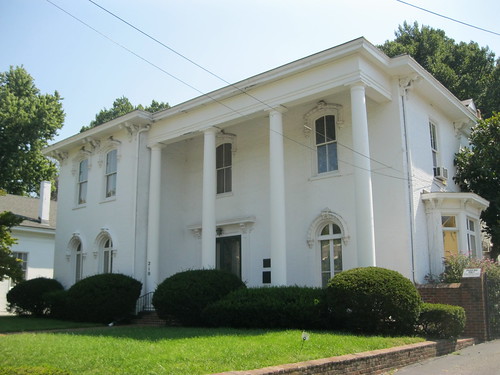 |
| Thomas Hunt Morgan House – Lexington, Ky. |
Today, we all know that sex is determined by XX or XY chromosomes. But did you know that the man who discovered this scientific truth was born and raised in Lexington? Thomas Hunt Morgan, the “Father of Modern Genetics,” was born in 1866 at Hopemont but was raised in his parent’s home on the other side of the block. Through his father’s lineage, Thomas was related to the best families in central Kentucky. A great-grandfather on his mother’s side, Francis Scott Key, penned the words to the Star Spangled Banner.
While living in this two-story Victorian, a young Thomas began to show his interest in biology and naturalism as he gathered birds, birds’ eggs and fossils. By the age of 16, he was enrolled at the State College, later the U. of Kentucky, from which he would graduate as the valedictorian in 1886. The Lexington Transcript reported on April 8, 1886 that “Thomas Hunt Morgan, son of Capt. Charleton H. Morgan, was awarded valedictory of class at State College.” It would not be long before Thomas Hunt Morgan would escape the long shadow of his father – a Confederate veteran – and bring another chapter to the Hunt-Morgan family.
Armed with a Ph.D. from Johns Hopkins College in Baltimore, Dr. Morgan entered academia and, after 13 years in Pennsylvania, began teaching at New York’s Columbia University. There he created his infamous “fly room” (popularizing the use of the inexpensive and fast breeding species) where he studied heredity at a chromosomal level.
In 1933, Dr. Morgan became the first Kentuckian to receive the Nobel Prize when he received the Nobel Prize in Physiology or Medicine for “his discoveries concerning the role played by chromosomes in heredity.”
After twenty-four years at Columbia, Morgan headed west for Caltech in Pasadena.
In 1925, Dr. Morgan’s mother passed away at the family home on North Broadway. In time, it would become the home to the Woman’s Club of Central Kentucky – an influential organization begun in 1894 and credited with many of Lexington’s social reforms around the turn of the twentieth century. In 1964, the Woman’s Club purchased the old Seventh Day Adventist church building and opened its auditorium in the old sanctuary in 1972.
Dr. Thomas Hunt Morgan passed away in 1945 in Pasadena. His alma mater, the University of Kentucky, named the biological sciences building after him in 1966.





photos on flickr
Sources: local.lexpublib.org; Nature.com; Nobel Prize bio; Women’s Club of Central Ky.
